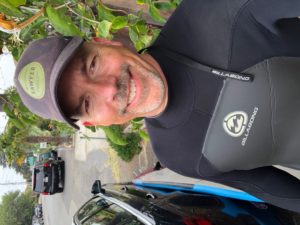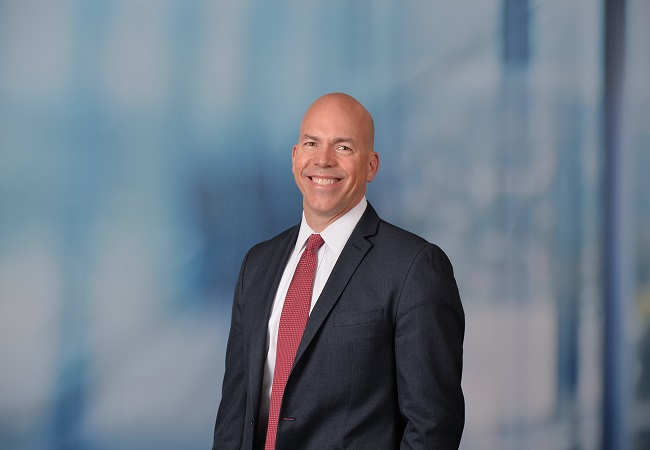Q: Growing up, what did you aspire to be?
A: When I was about 10 years old, I wanted to captain an America’s Cup yacht like Dennis Connor. The Americas Cup qualifying races came to Marblehead, Massachusetts, north of Boston, where we lived for much of my childhood. I thought it looked like the coolest job ever, and in fact I still think that! I would hang out on the town dock during regular weekly sailing races to volunteer as crew whenever I could. I am still happiest when I’m on or near the water—boating, surfing, swimming and sailing—always brings me a smile and sense of adventures to come.
Q: How did you end up in the investment management business?
A: When I was at University of California, Davis, I took a class on commodity futures markets—it was a required part of my degree in agricultural economics—and I was fascinated. After college, I was working as a Certified Public Accountant (CPA) for KPMG and was brought in with a number of others to replace the staff of a failed savings and loan after the Savings and Loan Crisis in the 1980s-1990s. The partner asked who wanted to run the fixed income portfolio and I raised my hand—true story! I had no idea what I was doing at first—in retrospect, it was pretty crazy to give a 24-year old CPA responsibility for a US$300 million portfolio. But I did a ton of reading and analyzing and asked a lot of questions. It was stressful and fun, and I actually did pretty well performance-wise. I was hooked.
Q: You have a master’s degree in finance from the University of London. What was it like studying in London and how similar or different was the educational approach in the United Kingdom compared with the United States?

A: That was a fantastic experience. I wanted to do a year abroad during my time as an undergraduate, but couldn’t really swing it financially, so it was my chance to study abroad, albeit much later in life and career. I love London—it’s one of my favorite cities. It’s incredibly cosmopolitan and diverse. My classmates were from all over the world—many from emerging countries in Africa and Asia. And many had a completely different perspective on finance and economics. They were also generally really good at “maths” as they say in the United Kingdom—I had to do some serious work to catch up. I was working at Franklin Templeton at the time, and it was great to be able to work out of the London office during the weeks I was over there. The company was very supportive. I am a big believer in always growing my knowledge base and continuous learning. I’m currently working on the CFA Environmental, Social and Governance certificate.
Q: What is the hardest part of your current role, and what is the most rewarding?
A: The hardest part is the competition. The most rewarding part is seeing my team succeed. Franklin Templeton has been in the multi-asset business for longer than most—since 1948—but we are relative newcomers to the custom solutions business. Some of our competitors have been at it for a long time and are impressive. But our strength is our team—I would stack our investment people and strategies against any of the competition. We have work to do on our technology platforms, but we are working on a new platform, and it is coming along well. Building and leading the investment team is hard. But the “hard is what makes it great,” as Tom Hanks’ character Jimmy Dugan famously said in the baseball movie “A League of Their Own,” especially when we win a new mandate or have a really good performance quarter. Those events are thrilling, like winning a sailboat race.
Q: How are you balancing the new world of work with people returning to the office and other people working from home or doing a hybrid arrangement?
A: We are still figuring that out, honestly, but I am a fan of the hybrid schedule because it provides some flexibility for people to better balance work and life responsibilities. Our community days are Tuesday and Wednesday, and we’ve actually had a pretty good crew coming in on most days, particularly in our San Mateo, California, headquarters. It really is nice to work with people in person, and we are working to make it worth the time and effort to be in the office. If someone is coming in and they are only on calls on their computer all day, being in the office is a hard sell. So, we try to meet up in person whenever possible and have group lunches and other interactions to make it more rewarding.
Q: Are there certain industry trends you are particularly excited about?
A: The democratization of private assets. When I was at CalPERS I could see the return and diversification benefits of investing in private real estate, credit and equity in a portfolio, including things like warehouses, toll roads and airports. These tended to behave quite differently than stocks and bonds and were resistant to some of the human behavioral quirks that can sabotage long-term returns. Stating the obvious, most investors don’t have access to those private assets. Part of the reason I came back to Franklin Templeton after CalPERS is the company’s long history of bringing institutional investments to the smaller investors. I’m really excited to see that plane taking off the runway now.
Q: To what do you attribute your success in your career and how you got to where you are now?
A: Muriel Seibert—the first woman member of the New York Stock Exchange (NYSE) and a real trailblazer elected to the NYSE when it was truly an “old boys club”—had a saying that I try to live every day: “Success is equal to work plus risk plus luck, in that order.” Charlie Johnson—one of my mentors and business role models—said something similar: “The harder you work, the luckier you get.” Franklin Templeton has been very supportive of my desire to build my skills by moving me across disciplines, starting in FT Services, then leading the company’s investment risk function for 10 years, then back to FT Solutions after my stint at CalPERS. Each of these moves required taking some risk, some luck and good timing, but mostly a lot of hard work with each transition.
Q: Do you still do anything related to enology and viticulture that you studied while getting your bachelor’s degree at the University of California, Davis?

A: Yes, after graduating I quickly discovered that the best way to make a small fortune in the wine industry is to start with a large one. For me, winemaking is a better hobby than profession. I make natural, organic wine at home every few years—some vintages are pretty good, some would be better used as paint stripper, but it is always a fun experiment.
Q: Any other passions or hobbies outside of work you would like to share?
A: I moved to Santa Cruz recently, specifically because I surf and mountain bike, and it is a great spot for both. My son is a professional mountain bike racer, so I try to keep up with him. That helps keep me in shape. Surfing is the hardest sport I’ve ever tried—except golf perhaps. Good surfers make it look smooth and effortless, but that is the result of a lot of time and practice. I’m pretty lame, but still it is fun to get out there. Exercise combined with time on the ocean is my therapy. During the pandemic I started playing guitar again—also very therapeutic—which I’ve really enjoyed. I would say I’ve moved from beginner to intermediate there. I’m always open to ride, surf or jam with people, so if you are in Santa Cruz, message me!
WHAT ARE THE RISKS?
All investments involve risks, including possible loss of principal. The value of investments can go down as well as up, and investors may not get back the full amount invested. Private equity investments involve a high degree of risk and are suitable only for investors who can afford to risk the loss of all or substantially all of such investment. Private equity investments may hold illiquid investments and its performance may be volatile. There can be no assurance that any investment will be adequately compensated for risks taken. A loss of an investor’s entire investment is possible. The timing of profit realization, if any, is highly uncertain. Real estate securities involve special risks, such as declines in the value of real estate and increased susceptibility to adverse economic or regulatory developments affecting the sector. The information provided is not a recommendation or individual investment advice for any particular security, strategy, or investment product and is not an indication of the trading intent of any Franklin Templeton managed portfolio. Diversification does not guarantee profit or protect against the risk of loss.
IMPORTANT LEGAL INFORMATION
This material is intended to be of general interest only and should not be construed as individual investment advice or a recommendation or solicitation to buy, sell or hold any security or to adopt any investment strategy. It does not constitute legal or tax advice. This material may not be reproduced, distributed or published without prior written permission from Franklin Templeton.
The views expressed are those of the investment manager and the comments, opinions and analyses are rendered as at publication date and may change without notice. The underlying assumptions and these views are subject to change based on market and other conditions and may differ from other portfolio managers or of the firm as a whole. The information provided in this material is not intended as a complete analysis of every material fact regarding any country, region or market. There is no assurance that any prediction, projection or forecast on the economy, stock market, bond market or the economic trends of the markets will be realized. The value of investments and the income from them can go down as well as up and you may not get back the full amount that you invested. Past performance is not necessarily indicative nor a guarantee of future performance. All investments involve risks, including possible loss of principal.
Any research and analysis contained in this material has been procured by Franklin Templeton for its own purposes and may be acted upon in that connection and, as such, is provided to you incidentally. Data from third party sources may have been used in the preparation of this material and Franklin Templeton (“FT”) has not independently verified, validated or audited such data. Although information has been obtained from sources that Franklin Templeton believes to be reliable, no guarantee can be given as to its accuracy and such information may be incomplete or condensed and may be subject to change at any time without notice. The mention of any individual securities should neither constitute nor be construed as a recommendation to purchase, hold or sell any securities, and the information provided regarding such individual securities (if any) is not a sufficient basis upon which to make an investment decision. FT accepts no liability whatsoever for any loss arising from use of this information and reliance upon the comments, opinions and analyses in the material is at the sole discretion of the user.
Products, services and information may not be available in all jurisdictions and are offered outside the U.S. by other FT affiliates and/or their distributors as local laws and regulation permits. Please consult your own financial professional or Franklin Templeton institutional contact for further information on availability of products and services in your jurisdiction.
Issued in the U.S. by Franklin Distributors, LLC, One Franklin Parkway, San Mateo, California 94403-1906, (800) DIAL BEN/342-5236, franklintempleton.com – Franklin Distributors, LLC, member FINRA/SIPC, is the principal distributor of Franklin Templeton U.S. registered products, which are not FDIC insured; may lose value; and are not bank guaranteed and are available only in jurisdictions where an offer or solicitation of such products is permitted under applicable laws and regulation.
CFA® and Chartered Financial Analyst® are trademarks owned by CFA Institute.

